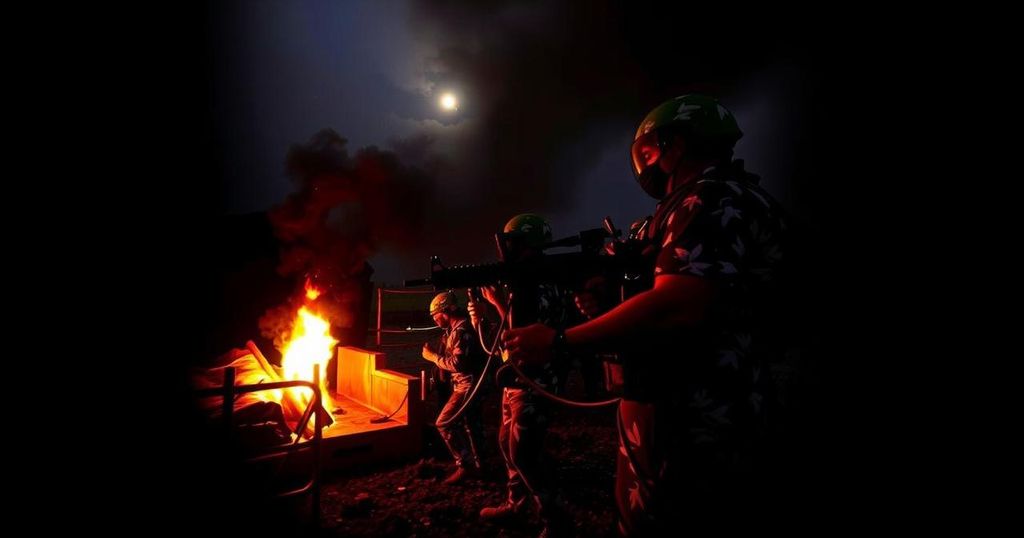Egypt Proposes Two-Day Ceasefire in Gaza for Hostage Release

Egypt’s President Abdel Fattah el-Sissi has proposed a two-day ceasefire between Israel and Hamas to potentially secure the release of four hostages and allow humanitarian aid to Gaza. The proposal also includes provisions for releasing Palestinian prisoners. Discussions are anticipated to proceed in Qatar, with no reaction yet from either party. Tensions remain high amid ongoing violence, with significant casualties reported in the conflict since October 7, 2023.
Egyptian President Abdel Fattah el-Sissi has proposed a two-day ceasefire between Israel and Hamas that could facilitate the release of four hostages currently held in Gaza. Announced on Sunday, the proposal also includes provisions for the release of several Palestinian prisoners and the delivery of humanitarian aid to the besieged territory. Despite the proposal, there has yet to be a response from either Israel or Hamas, while discussions are anticipated to continue in Qatar, which is playing a pivotal role as a mediator in the ongoing conflict. President Sissi described the ceasefire as a step to ‘move the situation forward,’ reflecting a hope for negotiations that might eventually lead to a more lasting resolution. Efforts for a long-term ceasefire have faced numerous setbacks. Hamas maintains that the withdrawal of Israeli forces from Gaza must precede any ceasefire agreement, while Israeli Prime Minister Benjamin Netanyahu has asserted that military operations will continue until Hamas is entirely dismantled. Notably, there has not been a ceasefire since November of the previous year. On the day of President Sissi’s proposal, Israel’s Mossad chief visited Doha for discussions with the Prime Minister of Qatar and the director of the CIA, aiming to mitigate the escalating violence and address heightened regional tensions following Hamas’ attack on Israel on October 7, 2023. This attack triggered a complex multi-front conflict, wherein Israel is engaged in confrontations with both Hamas and Hezbollah—a militant group supported by Iran. For the first time, Israel openly targeted Iranian positions in response to the launching of numerous cruise missiles from Iran toward Israel. Iran’s Supreme Leader, Ayatollah Ali Khamenei, advised a cautious approach following Israeli strikes, refraining from explicitly calling for direct retaliation. Meanwhile, Prime Minister Netanyahu has claimed that progress has been made in degrading Iran’s military capabilities, particularly regarding missile production. In a governmental memorial to commemorate the anniversary of the October 7 attack, Israeli Defense Minister Yoav Gallant highlighted the necessity for ‘painful compromises’ to secure the release of the hostages. He acknowledged that military strategies alone may not achieve the desired outcomes. Protests erupted during Netanyahu’s address, with demonstrators expressing outrage over the government’s perceived shortcomings in national security and the effort to rescue 70 hostages believed to be still alive and in captivity with Hamas. The situation in Lebanon remains precarious, as Hezbollah has intensified its assaults on Israeli forces in response to the conflict. Israeli airstrikes in southern Lebanon have resulted in multiple casualties, underscoring the broader implications of the hostilities for regional stability. Additionally, a recent truck attack near Tel Aviv resulted in a fatality and injuries to over thirty individuals, reportedly attributed to an Arab citizen. In Gaza, ongoing Israeli airstrikes have led to the deaths of at least 33 individuals, predominantly women and children, as reported by the Gaza Health Ministry. The continuing Israeli offensive has contributed to a dire situation in the territory. UN Secretary-General António Guterres has described the humanitarian conditions for Palestinians as ‘unbearable.’ The Gaza Health Ministry reports that over 42,000 Palestinians have lost their lives since the beginning of the conflict, which erupted following Hamas’ assault on October 7 that led to approximately 1,200 Israeli fatalities and the abduction of around 250 hostages. The violence has devastated much of Gaza, resulting in the displacement of approximately 90 percent of its 2.3 million inhabitants—marking a catastrophic episode in the protracted Israeli-Palestinian conflict.
The ongoing conflict between Israel and Hamas has persisted for decades and has recently escalated following a surprise attack by Hamas on Israel on October 7, 2023. This marked a significant escalation in hostilities, resulting in substantial casualties on both sides. Throughout this period, efforts to establish a ceasefire have faced numerous challenges, often stalling due to preconditions set by both parties. Egypt, having historically played a mediating role in the Israeli-Palestinian conflict, has now stepped forward with a ceasefire proposal that not only aims to halt the violence but also seeks to address the humanitarian plight of those affected in Gaza. In light of the complex geopolitical landscape, including Iran’s involvement and the reactions of regional powers, any ceasefire agreement remains fraught with difficulties. The humanitarian crisis in Gaza, exacerbated by continuous military operations, requires urgent attention and international support to alleviate suffering.
In conclusion, the two-day ceasefire proposal put forth by Egyptian President Abdel Fattah el-Sissi represents a potential opportunity to mitigate the ongoing violence between Israel and Hamas. The suggested ceasefire aims to facilitate the release of hostages and the provision of humanitarian assistance to the people of Gaza, with the hope of fostering negotiations toward a more permanent resolution. However, the complexities of the ongoing conflict, including both parties’ preconditions and regional tensions, pose significant challenges to the realization of this proposal. The dire humanitarian situation continues to deteriorate, emphasizing the urgency for a concerted international response to alleviate the suffering of those affected.
Original Source: www.newsweek.com








